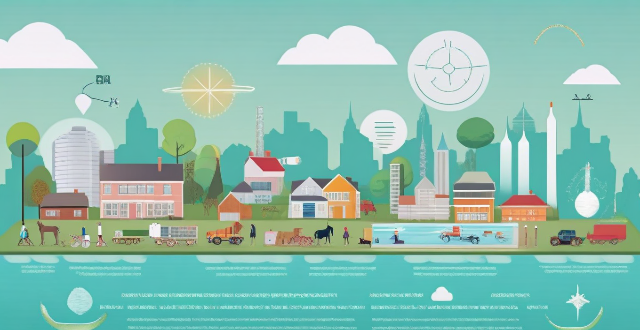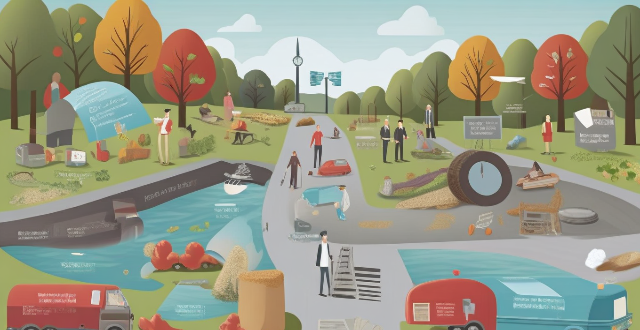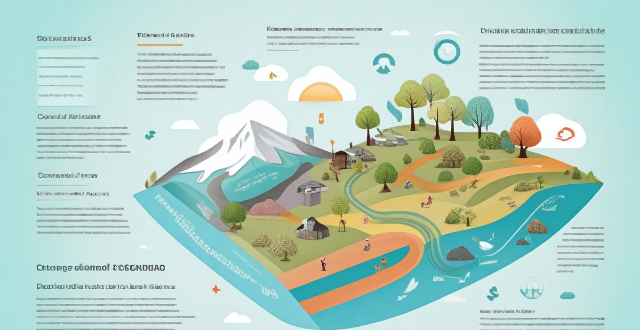Change Benefit

How can developing countries benefit from implementing renewable energy solutions ?
Renewable energy solutions offer significant benefits for developing countries, including reduced energy costs, job creation, improved health and environmental quality, increased energy security, and climate change mitigation. By investing in renewable energy infrastructure, these countries can build more sustainable and prosperous futures for themselves and their citizens.

How do developing countries benefit from the Clean Development Mechanism (CDM) ?
How Developing Countries Benefit from the Clean Development Mechanism (CDM) The Clean Development Mechanism (CDM) of the Kyoto Protocol brings numerous benefits to developing countries, including technology transfer, sustainable development, and environmental advantages. It also enhances their capacity building, global engagement, and influences policy-making towards sustainability. Overall, the CDM aids in reducing emissions while fostering economic growth and environmental conservation.

How can developing countries benefit from climate information sharing ?
Climate information sharing is vital for developing countries to address climate change challenges, offering benefits such as improved agricultural planning, disaster risk reduction, public health protection, economic development, and informed policy-making. By utilizing this data, these nations can adapt to environmental changes, build resilience, and ensure sustainable growth.

How can we ensure that climate adaptation strategies are equitable and benefit all members of society ?
Ensuring equitable climate adaptation strategies is crucial to protect vulnerable groups and future generations from disproportionate impacts of climate change. Key considerations include recognizing inequalities, involving affected communities in decision-making, fairly distributing costs and benefits, building capacity through education and skills development, mainstreaming equity into policies, and focusing on long-term sustainability.

What are the benefits of community-based adaptation to climate change ?
Community-based adaptation (CBA) to climate change is a process where communities use their local knowledge, resources, and skills to cope with the impacts of climate change. CBA has several benefits that make it an effective approach to addressing the challenges posed by climate change. These benefits include improved resilience, enhanced social capital, increased adaptive capacity, and cost-effectiveness. Improved resilience is achieved through localized solutions and empowerment. Enhanced social capital is achieved through collaboration and cooperation, as well as capacity building. Increased adaptive capacity is achieved through flexibility and innovation. Cost-effectiveness is achieved through lower costs and sustainability. Overall, CBA offers numerous benefits for addressing the challenges posed by climate change.

What role do sponsors play in sports charity events, and how do they benefit from it ?
The role of sponsors in sports charity events is crucial for the success of these events. Sponsors provide financial support, enhance brand awareness, promote corporate social responsibility, and create networking opportunities. In return, they benefit from increased exposure and brand recognition, building relationships with key stakeholders, potential tax benefits, and measurable results. Overall, sponsoring sports charity events allows companies to contribute to a worthy cause while positioning themselves as responsible corporate citizens committed to making a positive impact on society.

How does space exploration benefit humanity ?
The benefits of space exploration for humanity include technological advancements, economic growth through job creation and commercial opportunities, global collaboration fostering peace, scientific discoveries about our universe, inspiration and education for future generations, preserving Earth by monitoring environmental changes, and national security measures. These benefits touch every aspect of human life, making space exploration a significant investment in our collective future.

How do economists assess the costs and benefits of climate change negotiations ?
Economists use a cost-benefit analysis framework to assess the economic implications of climate change negotiations, considering various factors and uncertainties to inform policymakers about the economic implications of different strategies.

How does the issuance of green bonds benefit environmental projects ?
Green bonds are financial instruments designed to fund environmentally friendly projects, offering benefits such as increased funding opportunities, improved project visibility, long-term financing, risk mitigation, market growth and innovation, policy and regulatory support, and community and environmental impact. These bonds not only benefit the specific environmental projects they aim to fund but also contribute to a broader shift towards sustainable finance and environmental stewardship.

How does climate change affect consumer behavior ?
Climate change is affecting consumer behavior by increasing environmental awareness, changing shopping habits, driving a shift towards green energy, promoting sustainable food choices, and inspiring advocacy and activism. As consumers become more conscious of their impact on the environment, they are making changes in their purchasing habits to reduce their carbon footprint. Businesses that prioritize sustainability will be better positioned to succeed as consumers continue to make eco-friendly choices.

What are the benefits of youth participation in climate change initiatives ?
Youth participation in climate change initiatives is crucial for several reasons. Here are some of the benefits: ### 1\. **Education and Awareness** - **Increased Knowledge:** Young people who participate in climate change initiatives gain a deeper understanding of the science behind climate change, its causes, and potential solutions. This knowledge can be used to make informed decisions about their own lives and advocate for change in their communities. - **Awareness of Environmental Issues:** Through participation, youth become more aware of environmental issues such as deforestation, pollution, and biodiversity loss. This awareness can lead to lifestyle changes that reduce their carbon footprint and inspire others to do the same. ### 2\. **Skill Development** - **Leadership Skills:** Participating in climate change initiatives often involves working with teams, planning events, and advocating for change. These experiences help young people develop leadership skills that will be valuable throughout their lives. - **Communication Skills:** Climate change initiatives require effective communication to raise awareness, share information, and persuade others to take action. Participating in these initiatives helps young people develop strong communication skills that will benefit them in all areas of life. ### 3\. **Policy Influence** - **Voices Heard:** Young people represent a significant portion of the population and have unique perspectives on climate change issues. By participating in initiatives, they can ensure that their voices are heard by policymakers and influence policies related to climate change. - **Advocacy Efforts:** Youth involvement in climate change initiatives often includes advocacy efforts aimed at convincing governments and businesses to adopt more sustainable practices. These efforts can lead to real change on a local, national, or even global level. ### 4\. **Personal Growth** - **Sense of Purpose:** Participating in climate change initiatives can give young people a sense of purpose and motivation to make positive changes in the world around them. This sense of purpose can lead to greater satisfaction with life and increased mental well-being. - **Confidence Building:** Successfully participating in climate change initiatives can build confidence and self-esteem by showing young people that they have the power to create positive change in their communities and beyond. ### 5\. **Networking Opportunities** - **Connections with Like-Minded Individuals:** Participating in climate change initiatives provides opportunities for young people to connect with others who share their passion for environmental protection and sustainability. These connections can lead to lasting friendships, collaborations, and professional opportunities down the line. - **Mentorship Opportunities:** Many climate change initiatives involve working alongside experienced professionals who can serve as mentors and provide guidance on career paths related to environmental protection and sustainability.

What are the implications of climate change negotiations for future generations ?
The implications of climate change negotiations for future generations are significant and multifaceted, affecting various aspects of life, including the environment, economy, society, and politics. Effective negotiations can lead to preserved natural ecosystems, mitigation of extreme weather events, job creation in renewable energy sector, reduction in energy costs, improved public health, enhanced quality of life, global cooperation, and leadership and innovation. These benefits highlight the importance of prioritizing the interests of future generations in climate change negotiations to ensure a sustainable and equitable world for all.

What are the economic costs and benefits of adapting to climate change ?
The text discusses the economic costs and benefits of adapting to climate change, which include direct costs such as infrastructure upgrading and water management systems, indirect costs like economic disruptions and resource reallocation, direct benefits including increased resilience and improved efficiency, and indirect benefits such as job creation and technological innovation. The conclusion states that the long-term benefits of adapting to climate change outweigh the costs, leading to more resilient economies.

What is the impact of climate change on biodiversity and conservation law ?
Climate change is a significant threat to biodiversity, affecting species distribution, abundance, and behavior. This has implications for conservation law, which aims to protect and manage biodiversity. The impact of climate change on biodiversity includes habitat loss and fragmentation, altered ecosystem functioning, and increased risk of species extinction. Conservation law must evolve to address these challenges, incorporating resilience measures into conservation strategies and fostering collaboration across sectors. By taking a proactive approach, we can help ensure that future generations continue to benefit from the diverse array of species and ecosystems that make up our planet's natural heritage.

How can businesses benefit from investing in Climate-Smart Technologies ?
Businesses can benefit from investing in climate-smart technologies by improving efficiency, reducing costs, gaining a competitive edge, staying compliant with regulations, mitigating risks associated with climate change, and attracting talent.

What industries benefit most from carbon credit systems ?
Carbon credit systems provide financial and competitive advantages to industries that reduce greenhouse gas emissions. Renewable energy producers, energy-efficient manufacturers, carbon capture and storage tech companies, forestry and land use management, and the transportation sector are among the biggest beneficiaries. These industries can earn additional income, attract investment, foster innovation, and gain market share by participating in carbon credit markets, thus contributing to a sustainable future.

How can carbon credit systems be improved to better address climate change ?
Enhancing Carbon Credit Systems for Effective Climate Change Mitigation. Carbon credit systems are financial instruments designed to reduce greenhouse gas emissions by providing economic incentives for emission reductions. While these systems have the potential to contribute significantly to climate change mitigation, they currently face several challenges that limit their effectiveness. Here's how we can improve them: 1. Strengthening Verification and Monitoring 2. Addressing Additionality and Leakage 3. Improving Permanence and Reversibility 4. Broadening Project Types and Incentives 5. Aligning with International Climate Goals 6. Expanding Market Access and Participation 7. Promoting Fairness and Justice

How might climate change affect long-term investment returns and what should investors do about it ?
Climate change is a global phenomenon that has the potential to significantly impact long-term investment returns. Here are some ways in which climate change could affect investments: 1. Impact on Asset Prices: Climate change can affect the prices of various assets, including stocks, bonds, and real estate. For example, companies that rely heavily on fossil fuels or are located in areas vulnerable to climate-related risks may see their stock prices decline. On the other hand, companies that focus on renewable energy or have strong sustainability practices may see their stock prices increase. 2. Changes in Industry Landscape: Climate change can also lead to shifts in the industry landscape. Industries that are heavily reliant on natural resources, such as agriculture and fishing, may be negatively impacted by climate change. Conversely, industries that focus on sustainability and renewable energy may experience growth. 3. Regulatory Risks: Governments around the world are implementing policies to combat climate change, which could impact certain industries. For example, regulations aimed at reducing carbon emissions could negatively impact companies in the fossil fuel industry. Investors need to be aware of these regulatory risks and how they might impact their investments. 4. Physical Risks: Climate change can also pose physical risks to investments. For example, extreme weather events like hurricanes and floods can damage property and infrastructure, affecting the value of real estate investments. Similarly, droughts and other climate-related events can impact agricultural yields, affecting the profitability of farming-related investments. Given the potential impact of climate change on investments, investors should take steps to mitigate these risks. Here are some strategies that investors can consider: 1. Diversify Your Portfolio: Diversification is always a smart strategy when it comes to investing, and this holds true when considering the impact of climate change. By diversifying your portfolio across different asset classes and industries, you can reduce your exposure to any one sector that might be negatively impacted by climate change. 2. Invest in Sustainable Companies: Investing in companies that prioritize sustainability and have strong environmental practices can help mitigate the risks associated with climate change. These companies are often better positioned to adapt to changing market conditions and may even benefit from shifts towards more sustainable practices. 3. Consider Impact Investing: Impact investing involves investing in companies or funds that have a positive social or environmental impact, in addition to financial returns. This can be a good way to align your investments with your values and support sustainable businesses that are working to address climate change. 4. Stay Informed About Climate Risks: Finally, it's important for investors to stay informed about the potential risks that climate change poses to their investments. This includes staying up-to-date on government policies related to climate change and monitoring how these policies might impact different industries and asset classes.

How can developing countries benefit from international cooperation ?
Developing countries can benefit from international cooperation in multiple ways, including access to technology and innovation, economic growth and trade opportunities, improved healthcare and education, environmental sustainability, and political stability and peace. Technology transfer, research collaborations, capacity building, trade agreements, foreign direct investment, infrastructure development, medical aid, educational exchange programs, renewable energy projects, conservation efforts, clean technology transfer, conflict resolution, democratic institution building, and legal and judicial reform are some of the key areas where developing countries can gain from working with their international counterparts.

What are the psychological benefits of connecting with nature, and how can they mitigate the effects of climate change ?
Connecting with nature has numerous psychological benefits that can significantly improve our mental and emotional well-being. These benefits include reducing stress and anxiety, boosting mood and happiness, improving concentration and cognitive function, enhancing creativity, promoting emotional resilience, and fostering mindfulness and present-moment awareness. Additionally, the psychological benefits of connecting with nature play a crucial role in mitigating the effects of climate change by increasing environmental awareness, promoting sustainable behaviors, inspiring collective action, and encouraging policy changes. By recognizing the importance of nature for our mental health and taking action to protect it, we can work towards a healthier planet and a happier population.

How do climate change and sustainable development goals (SDGs) intersect ?
The intersection of climate change and sustainable development goals (SDGs) is crucial for creating a sustainable future. Climate change affects all aspects of sustainable development, from health and well-being to clean water and sanitation to affordable and clean energy. To effectively address climate change within the context of sustainable development, it is important to integrate climate actions into each SDG through strategies such as integrated planning, finance and investment priorities, and education and awareness campaigns. By doing so, we can work towards a more sustainable future for our planet.

What are the benefits of teaching children about climate change ?
Teaching children about climate change is crucial for their future, empowering them to take action and make a difference. It enhances their awareness, critical thinking skills, environmental stewardship, innovation, preparation for future careers, empathy, responsibility, healthy habits, resilience, and interest in science and technology. This education can lead to informed decision-making, problem-solving abilities, responsible behavior towards the environment, and a sense of global citizenship. By teaching children about climate change, we are preparing them to confront one of the most significant challenges facing our planet.

How can celebrities use their influence for social change ?
Celebrities have a unique opportunity to use their influence for social change. They can leverage their fame and platform to bring attention to important issues, inspire their fans to take action, and make a positive impact on the world. Celebrities can use their platform to raise awareness about important social issues, inspire their fans to take action by sharing their own experiences and stories related to social issues, partner with organizations that are working towards social change, use their talents and skills to support social change initiatives, and advocate for policy changes at the local, national, or international level. By doing so, celebrities can help shape laws and regulations that promote social justice and equality.

What is the role of carbon credits in mitigating climate change ?
Carbon credits are a crucial tool in the fight against climate change, providing economic incentives for reducing greenhouse gas emissions. They work by allowing companies or countries that emit less than their allocated amount of carbon to sell their surplus credits, creating a market-based mechanism for efficient emission reduction. While effective, challenges include ensuring the quality of credits and addressing equity concerns. As global climate targets become more ambitious, the role of carbon credits is expected to expand, with innovations needed to enhance their effectiveness and integration with other climate policies.

What is the importance of including climate change in school curriculums ?
Including climate change in school curriculums is crucial for raising awareness, promoting action and advocacy, and preparing students for a sustainable future. By educating students about the causes and effects of climate change, as well as potential solutions, they gain knowledge, critical thinking skills, and a global perspective. This can motivate them to take action, become advocates for climate action, and pursue careers related to climate change. Including climate change in the curriculum also has the potential to create a generational shift in attitudes towards the environment, foster innovation and creativity in finding solutions, and develop future leaders who prioritize environmental issues.

How can schools incorporate climate change education into their curriculum ?
Incorporating climate change education into school curriculums is crucial for preparing students to address the global issue of climate change. Schools can integrate climate change concepts into existing subjects like science, social studies, literature, and mathematics. Science and geography classes can teach about the causes and effects of climate change, while social studies and history courses can provide a historical perspective on environmental challenges and analyze current policies. Literature and language arts classes can study works that address environmental themes, and mathematics and technology courses can explore data analysis and innovative solutions to combat climate change. Interdisciplinary approaches such as project-based learning and service learning can further enhance climate change education. Research projects and community outreach initiatives allow students to apply their knowledge in real-world settings, promoting interdisciplinary thinking and fostering a sense of personal responsibility for contributing to positive change. Overall, incorporating climate change education into school curriculums is essential for empowering students with the knowledge and skills needed to make informed decisions and take action towards a more sustainable future.

What are the potential economic benefits of investing in climate adaptation ?
Investing in climate adaptation can bring about several potential economic benefits, including reduced costs of disaster response and recovery, increased resilience of infrastructure and assets, enhanced productivity and efficiency, new business opportunities, and improved health outcomes. These benefits make it an essential component of any comprehensive strategy for addressing climate change and its impacts on our economy and society.

Can rural areas benefit from 5G network deployment ?
The advent of 5G technology promises to revolutionize the way we live, work, and communicate. With its faster speeds, lower latency, and increased capacity, 5G has the potential to transform various sectors, including healthcare, education, transportation, and more. However, the question remains: can rural areas also benefit from 5G network deployment? Benefits of 5G in Rural Areas: - Improved Connectivity: Faster Internet Speeds and Reduced Latency - Enhanced Quality of Service: Better Coverage and Increased Capacity - Economic Development: Job Creation and Business Opportunities - Social Benefits: Education and Healthcare Challenges and Considerations: - Infrastructure Costs: High Initial Investment and Maintenance Expenses - Geographic Barriers: Topography and Population Density - Regulatory Hurdles: Spectrum Allocation and Compatibility Issues Conclusion: While there are certainly challenges associated with deploying 5G networks in rural areas, the potential benefits are significant. Improved connectivity, enhanced quality of service, economic development, and social benefits all stand to gain from the introduction of 5G technology. As long as these challenges are addressed through careful planning, collaboration between stakeholders, and appropriate investment, rural areas can indeed benefit from 5G network deployment.

What are the benefits of adopting TCFD for a company's stakeholders ?
Adopting TCFD can bring numerous benefits to a company's stakeholders, including investors, lenders, employees, customers, suppliers, and the general public. By providing more transparent and comprehensive information about a company's exposure to climate-related risks, TCFD can help stakeholders make more informed decisions, reduce uncertainty, and build trust between companies and their stakeholders. Some key benefits for investors include enhanced risk management, improved valuation accuracy, and increased alignment with ESG criteria. Lenders benefit from reduced lending risk, improved credit analysis, and increased transparency. Employees gain enhanced job security, improved workplace safety, and increased employee engagement. Customers, suppliers, and the general public benefit from improved product quality and safety, enhanced supply chain resilience, and increased corporate social responsibility.

How does climate change affect education ?
Climate change impacts education through extreme weather events, health issues, food insecurity, economic challenges, social changes, and environmental degradation. These effects necessitate collaboration between educators and policymakers to develop resilient strategies for adapting to climate change.